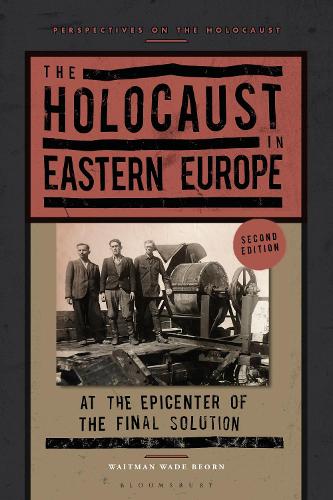
The Holocaust in Eastern Europe: At the Epicenter of the Final Solution
(Paperback, 2nd edition)
Available Formats
Paperback
Published: 8th February 2018
Hardback
Published: 8th February 2018
Paperback, 2nd edition
Published: 27th November 2025
Hardback, 2nd edition
Published: 27th November 2025
Publishing Details
The Holocaust in Eastern Europe: At the Epicenter of the Final Solution
By (Author) Professor Waitman Wade Beorn
Bloomsbury Publishing PLC
Bloomsbury Academic
27th November 2025
2nd edition
United Kingdom
Classifications
Tertiary Education
Non Fiction
European history
Second World War
Physical Properties
Paperback
384
Width 156mm, Height 234mm
Description
This book provides an authoritative history of the Holocaust in Eastern Europe and makes a compelling case for why the region can be considered the epicentre of the final solution. Waitman Wade Beorn introduces us to pre-war Jewish life in Eastern Europe, before tracing the escalating nature of Nazi policies in the area during the Second World War. Beorn crucially reflects on the German obsession with the East and its impact on the Nazi genocidal project there. The Holocaust in Eastern Europe also examines Soviet occupation and its consequences for the Shoah, while offering vital coverage of key themes like ghettoization, the Final Solution, rescue, collaboration, resistance, and many others. The book considers the commonalities and differences of regional Holocaust experiences from the perspectives of perpetrators, witnesses, collaborators, and victims/survivors. Adeptly incorporating material on challenging subjects like sexual violence, the use of slave labour, the treatment of Soviet POWs, and profiteering, this 2nd edition includes two brand new chapters that enhance the scope and usefulness of the text even further; one addresses sources, methods, historiographical debates in the field, and the other focuses on non-Jewish victims of the Nazi genocidal project, such as Soviet prisoners of war, the mental and physically handicapped, Sinti and Roma, and other civilians.
Author Bio
Waitman Wade Beorn is Senior Lecturer in History at Northumbria University, UK. He is the author of Marching into Darkness: The Wehrmacht and the Holocaust in Belarus (2014, winner of the Thomas J. Wilson Memorial Prize).
